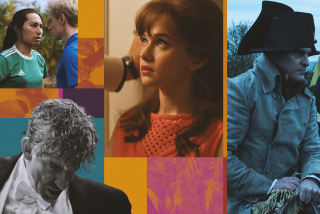A Dickens for Our Times
- Share via
It was the memory of the beloved 1946 David Lean film, not the landmark Charles Dickens’ novel, that haunted the new “Masterpiece Theatre” production of “Great Expectations,” airing Sunday and Monday on PBS.
“Curiously, when we set out to do it, [the movie] was more daunting than the book itself,” explains producer David Snodin. “You feel so overwhelmed by the visual imagery in that film. Some people who never read the book think they have read it because they remember [the movie]. The Lean film seems to be the yardstick by which every dramatization is judged.”
Adds adapter Tony Marchant: “It is supposed to be a cinematic masterpiec--the definitive Dickens’ dramatization.”
Marchant, though, hadn’t seen the film since he was a youngster. Before he began adapting Dickens’ 1861 novel, he watched the story as defined by Lean again. Much to his surprise, he discovered the Oscar-winning film hasn’t withstood the ravages of time.
“I have to say I found it creaky in a lot of ways, terribly old-fashioned,” Marchant says. “It was very much a film of its time, which was 53 years ago. Obviously, when it was made it had a huge impact and deservedly so, I suppose. But I felt we needed to pay much closer attention to the psychological realism in a contemporary version.”
Despite the ill-fated, updated 1998 feature version starring Gwyneth Paltrow and Ethan Hawke, Snodin felt that “Great Expectations” needed to be remade with a ‘90s sensibility.
“It hasn’t been done on British TV since 1981,” he explains. “A work like this of such spectacular range and depth should be revisited every 10 years, if only to encourage people to go back to the book.”
The original, offers Snodin, was made just after the end of World War II. “I think that version is as much of the ‘40s as ours is of the ‘90s. That was made after they had all come out of the war, so it has a much more, if you like, romantic upbeat quality in the end, whereas our ending is much more ambiguous and more mature.”
Snodin also attempted to cast this production with performers who were closer in age to Dickens’ characters than in the Lean film. Though he gave an engaging performance, John Mills was 38 when he played the twentysomething Pip back in 1946. In this version, 24-year-old Ioan Gruffudd of A&E;’s “Horatio Hornblower” seems to have stepped off the pages of Dickens’ novel as Pip.
“Forty or 50 years ago, the cinema was not a realistic medium,” Snodin says. “I think audiences have great expectations in needing to engage and believe in the characters, however weird the world they live in is.”
Dickens offered a rich palette to work with in his tale of an abused orphan boy, Pip. The story of his life, a series of twists, opens when he befriends escaped convict Magwitch (Bernard Hill), then becomes a plaything to the insane heiress Miss Havisham (Charlotte Rampling), ends up falling in love with her cold-hearted but beautiful ward, Estella (Justine Waddell), and is transformed into a gentleman thanks to the patronage of a mysterious benefactor.
This three-hour adaptation, which was a huge hit when it aired last month in England, emphasizes peoples’ cruelty toward each other.
“I think it says something very strong about the need for a child to be loved, which, I think, is terribly relevant to this day and age,” says Snodin. “I don’t know if it is a huge issue over there, but child abuse has become a massive issue over in this country.”
In fact, “Great Expectations,” explains Marchant, chronicles several abuses. “Pip’s physical abuse is paralleled by Estella’s psychological abuse from Miss Havisham,” he says. “It is the attitude she fashioned around Estella toward men and her sexuality, which is not enjoyed for itself but a weapon to be used to claim an ascendancy over men.”
Waddell, who starred last year in A&E;’s production of “Tess of the D’Urbervilles,” jumped at the chance to play the coldhearted, manipulative Estella. Though she had seen the Lean film, she had never read the book.
“I read it after the audition,” she says, laughing. “I knew that she was nasty so I went into the audition and I did nasty. Afterwards, I read the book and said, ‘Oh God, I’m so embarrassed. I haven’t read this.’ ”
She found the book to be not only beautifully written, but also brutal and funny. “I imagine it is one of those books that if I read it 10 years from now, I could carry something different from it.”
Waddell hopes viewers will have more sympathy for her character in this version. “I think Tony Marchant gives Estella a lot more understanding in terms of the audiences’ perception of her by explaining why she is what she is. I think you see that childhood abuse quite clearly. You are more sympathetic to Estella and Pip. In some almost subliminal way, ‘Great Expectations’ is about how the effects of childhood ripple through the rest of your life.”
“Great Expectations” airs Sunday and Monday at 9 p.m. on KCET-TV. The network has rated it TV-PG (may be unsuitable for children younger than 14).
More to Read
Only good movies
Get the Indie Focus newsletter, Mark Olsen's weekly guide to the world of cinema.
You may occasionally receive promotional content from the Los Angeles Times.











